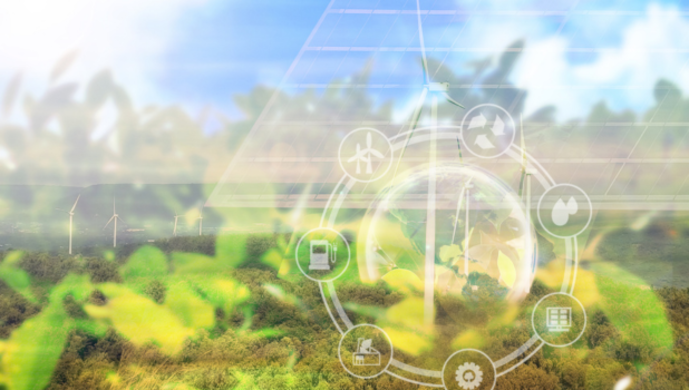What is the impact of different information types on sustainable technology adoption behavior and decisions by consumers? This is an important question for policymakers and providers of sustainable technologies such as renewable energy sources. If Europe is to achieve its ambitious targets for decarbonization and become the first carbon net zero continent by 2050, then the adoption of renewable energy systems needs to accelerate – and fast.
The “attitude-behavior gap”: strong green opinions, but few green acts
A variety of strategies have been used in the past to promote renewable energy, especially among households. These have typically included grants to subsidize the installation of systems and/or generous Feed-In-Tariffs (FITs) that could fully or partially guarantee a return on consumer investment. As the typical cost of renewable energy – in particular, the unit cost of photovoltaic (PV) installations – has become more affordable, these promotional strategies have significantly reduced.
Increasingly, communication and promotional campaigns to increase awareness of the social, economic, and environmental benefits of renewable energy are the main tools to promote the adoption of these technologies. And awareness has certainly been raised.
However, it is also increasingly clear that there is a significant gap between public attitudes and individual behaviors: people are happy to “talk the talk” about the need for sustainable energy and green technologies, but they are not “walking the walk” in terms of purchasing such systems.
Prevailing assumptions may be too simplistic
Our research took a deep dive into what lies behind this “attitude-behavior gap” to examine the impact of various forms of information on sustainable adoption behavior and decision-making by consumers. Our two crucial questions were: “What type of information supports innovation adoption behavior?” and “When, in the adoption process, is information the most effective?”
Our results suggest the prevailing assumption – that information and awareness support the adoption of innovation – may be too simplistic. What we found challenges the notion that providing more information always supports the eventual adoption of environmental technologies.
Our study argues that information affects sustainable attitudes and behaviors directly by increasing awareness and knowledge of low-carbon technologies.
Information can either promote or hamper the adoption of sustainable energy depending on its nature, the channels through which consumers acquire it, and the stage of the adoption process of the potential adopters.
But information also has an indirect effect, by allowing consumers to become aware of social norms and beliefs and by influencing the “self-other trade-off” – the balance between selfish personal well-being considerations and notions of the wider societal benefits, which characterizes many sustainability decisions (i.e., Why should I be the only one making an effort that will benefit everyone?).
However, not all information supports sustainable consumer behavioral change and the adoption of environmental technologies.
Our findings indicate information facilitates the development of sustainable attitudes, but it does not necessarily induce sustainable consumer behavior changes. In fact, it can either promote or hamper the adoption of environmental technologies depending on its nature, the channels through which consumers acquire it, and the stage of the adoption process when the potential adopters receive it.
Generic versus customized messages
We found that providing generic, non-customized information early in the adoption process raises awareness and facilitates the development of a positive attitude towards sustainable technologies as the consumer starts their initial journey towards adoption or purchase. This type of information increases consumer awareness and clarifies for them the collective benefits of the various eco-friendly alternatives.
These non-customized messages play an important role early on because they provide persistent information and prepare the ground for the subsequent stages in the adoption process. Without this minimum amount of knowledge, it would be difficult for potential adopters to ask relevant questions when the actual adoption decision is made.
Customized information reduces the vagueness and uncertainty often associated with eco-friendly decisions.
However, as consumers approach the final adoption or purchase decision, they tend to need more specific information to address their questions and requirements. Such customized information reduces the vagueness and uncertainty often associated with many eco-friendly decisions and helps resolve issues around the self-other trade-off. This customized approach is also more effective in addressing some of the potential concerns consumers have about sustainable technologies including poor aesthetics, performance issues, or high cost.
Should I trust this source?
Our results also indicate that the source of information influences sustainable consumer behavior and that this effect varies as consumers approach the end of the technology adoption process. Information provided by commercial sources, such as advertising material, is more useful during the early adoption stages when consumers first need to develop a sustainable attitude: it helps increase awareness and generates interest in the environmental issues addressed by the technology.
Unbiased information provided by trustworthy third parties, such as an independent regulator or advisory body, is much more effective than information coming from commercial sources.
Nevertheless, at later stages of the adoption process, when potential adopters already have adequate information on the technology, have already expressed interest, and are ready to translate their sustainable attitudes (the talk) into actual behaviors (the walk) by purchasing, things are different. At that point, trust in the source of information becomes key. Unbiased information provided by trustworthy third parties, such as an independent regulator or advisory body – is much more effective than information identified as serving any commercial interest. Receiving additional information from commercial sources may indeed provoke negative attitudes, raise suspicion, and potentially torpedo the investment.
A related finding of our study highlighted the relationship between the adoption of sustainable technologies, consumer income levels and concepts of value for money. With all other things being equal, we found that higher income levels and lower technology costs have a positive effect on attitude or the intention to adopt a technology, but again play no significant role in the actual adoption behavior.









